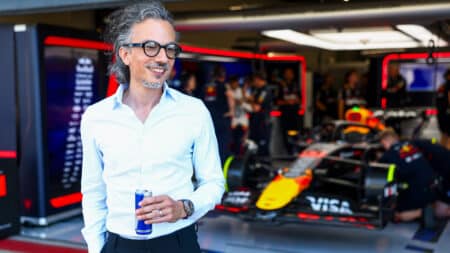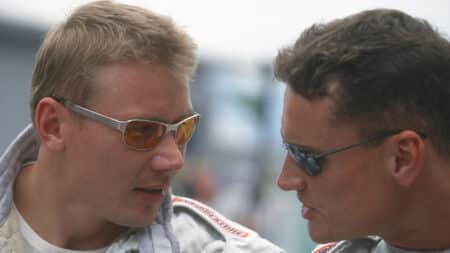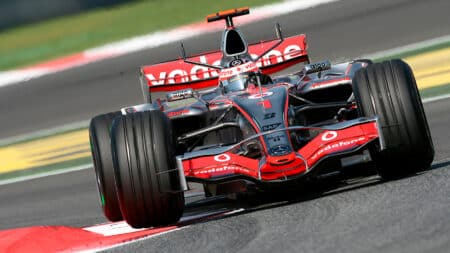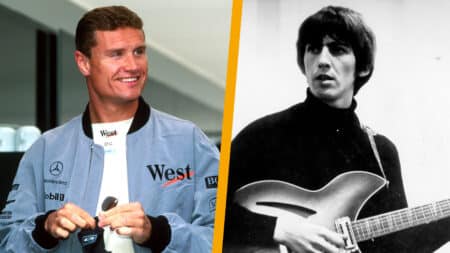
MPH: To the man trying to fill Christian Horner's shoes: good luck!
Laurent Mekies arrives as Red Bull F1 team principal with a series of immediate challenges to solve and long-term issues to tackle. He'll either sink or swim, says Mark Hughes
The French Grand Prix produced a Ferrari 1-2, but not in the order we expected. Until a broken exhaust slowed him, Kimi Raikkonen was comfortably in command, but just after half-distance he found himself down on power, and was obliged to let Felipe Massa through.

“Disappointing, of course,” said Raikkonen. “I had a good car all weekend, took pole, led easily…but these things happen sometimes, and at least I had enough gap over the others to finish second. There was quite a lot of damage to the car, so it’s quite lucky we finished – and eight points is good…”
Eight points were particularly good on a day when Lewis Hamilton didn’t score any. The McLaren team leader started well back, thanks to his 10-place penalty from Montreal, but after making some progress in the early laps incurred a drive through penalty (for missing the apex of a corner, and, in the estimation of the FIA stewards – one of them a Mr Despotopoulos – gaining an advantage from it, although not a place). That effectively ruled Hamilton out for the afternoon, and he finished a point-less 10th.
The happiest soul at Magny-Cours was, of course, Massa, who took his third win of the season, and in so doing became the first Brazilian to lead the World Championship since Ayrton Senna in early 1993. Significantly, he was also the fourth different points leader in four races.
“I have to say I didn’t expect this,” said Felipe, “but sometimes you need a little bit of luck, and today it was my turn. Kimi and I were two laps different on fuel – I had more – but it would have been…very difficult to pass him.” Make that ‘impossible’: until his exhaust problem intervened, Raikkonen was more than seven seconds ahead, and had checked out.
If a Ferrari victory were a foregone conclusion, Trulli’s podium place for Toyota was emphatically not, but very popular it was, for Jarno is among the most well-liked of all the drivers, and has driven consistently well this season, usually for little reward. As well as that, this was the first Grand Prix since the death of Ove Andersson, an immensely popular man who contributed enormously to Toyota’s motor sport achievements over the years. “All weekend,” said Trulli, “we wanted to have a good result to dedicate to Ove’s memory, and I’m very happy for that.”
Hamilton may have had a miserable time of it in France, but McLaren did not come away completely empty-handed, for Heikki Kovalainen finished fourth, after a grittily combative drive – also from way back on the grid. On the last lap he tried to put a move on Trulli, but Jarno was having nothing of that, thank you: the cars momentarily touched, then shot off in different directions, but finished in the same order.
Montreal winner Robert Kubica had to settle for fifth this time, and wasn’t too displeased with four points, given that BMW Sauber struggled with pace throughout the weekend (Nick Heidfeld finishing a wilderness 13th). Mark Webber, sixth, again finished well for Red Bull, and the Renaults of Piquet and Alonso seventh and eighth, Nelson finally putting in a reasonable performance on his eighth Grand Prix appearance.
In effect, though, race day at Magny-Cours was decided by the events of the day before, by qualifying. As Raikkonen pointed out, overtaking is nigh impossible at this circuit: if you start well, and don’t screw up, you’ll finish well, too, and that task is all the easier when your main rivals are nowhere on the grid.
After the incident in the pit lane at Montreal, which eliminated both Raikkonen and Hamilton, Kimi was untypically furious, and that was a surprise, for normally he keeps any show of emotion well under control. Even by Finnish standards, he is the most phlegmatic of racing drivers, and even though Hamilton was plainly at fault, one might have expected Raikkonen simply to shrug it off. After all, two weeks earlier, in the late laps of the Monaco Grand Prix, he had completely misjudged his braking at the chicane, and tanked into the back of Sutil’s Force India, which was at that point heading for fourth place – a place which Adrian had thoroughly deserved, after a faultless drive in treacherous conditions, and also a place potentially worth millions of dollars to one of the smaller teams in F1.
Despite all this, Raikkonen obviously thought it ‘a racing incident’, and one not even worthy of an apology. More to the point, so apparently did the powers-that-be, for Kimi went unpunished, and this was a thought in many a McLaren mind when the FIA stewards in Canada announced that Hamilton would carry a 10-place grid penalty into the next race. Nico Rosberg, whose Williams in turn lightly tapped into the back of Lewis’s car, was then bound to incur the same penalty.
On his first couple of quick laps in Q3 at Magny-Cours, Hamilton admitted, he goofed each time at the exit of turn seven, and in the end he was third, behind the two Ferraris, and disappointed. Given his penalty from Montreal, that meant that he started 13th, and McLaren’s cup truly ran over when it was announced that Kovalainen, having ‘driven slowly’ on an out lap, and hindered Webber, who was on a flier, would also be fined some grid slots – five in this case. Thus, the McLarens lined up 10th and 13th. Some teams seem positively to attract bad luck, do they not?
Still, Ferrari weren’t complaining, and neither were those others who benefited from this summary justice. Alonso, for example, was up to third, and starting from the clean side of the track. It was good to see Fernando – however little he had in the tank – up at the good-looking end of the grid, and another reminder of how wasted his talents have been this year.
For all he qualified brilliantly, however, it was obvious that Alonso was be among the first to come in for fuel, and for that strategy truly to pay off – beyond impressing the French crowd, anyway – his Renault needed to make a strong start, which it did not. Fernando really didn’t need to be behind Trulli’s Toyota in the first stint of the race, and thereafter was never a serious factor. A half-spin, two laps from the end of the race, allowed his team mate to get ahead of him.
Not a great race, the 2008 French Grand Prix – in fact, not really a race at all. However, against all expectations a new contract with Bernie Ecclestone has apparently been negotiated, so this was not, after all, the last time around for F1 at Magny-Cours. Confirmation of this is expected on Wednesday, when a provisional calendar for 2009 is to be issued by the FIA: a 20-race schedule is anticipated, this expected to comprise the 18 events in this year’s championship, plus a new Grand Prix in Abu Dhabi – and a welcome return to Indianapolis, after a single year’s absence.

Laurent Mekies arrives as Red Bull F1 team principal with a series of immediate challenges to solve and long-term issues to tackle. He'll either sink or swim, says Mark Hughes

Former McLaren F1 team-mates Mika Häkkinen and David Coulthard are set to renew old rivalries in a new Evening with... tour – they told James Elson all about it

In Formula 1, driver contracts may look iron-clad on paper, but history shows that some of its biggest stars have made dramatic early exits

Former McLaren F1 ace told James Elson about his private audience with The Beatles' George Harrison, who played an unreleased grand prix-themed song